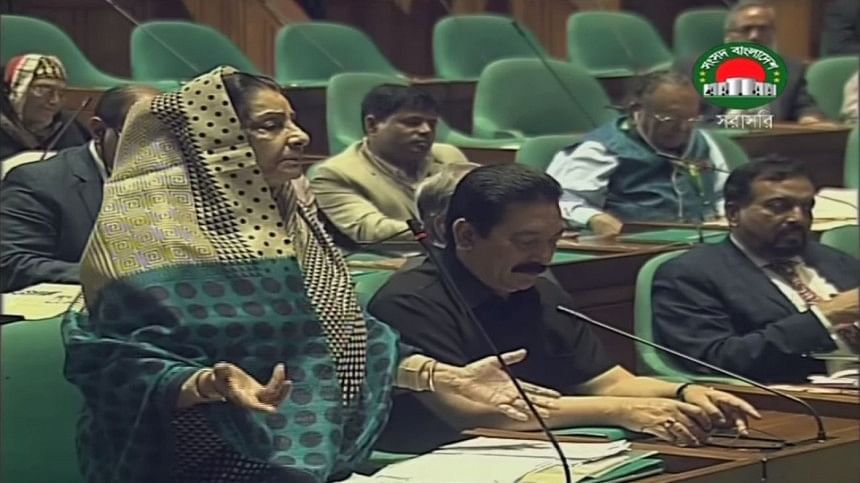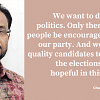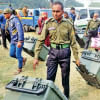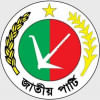The conundrum of an opposition party in the House

Opposition Leader Raushan Ershad's appeal on Tuesday (February 27) to Prime Minister Sheikh Hasina, to relieve three of her party MPs from the council of ministers to help the Jatiya Party emerge as the "real opposition" in parliament, sounds ridiculous. But in the present political context it is not something that would leave anyone dumbfounded. Her husband JP Chairman Ershad, who has remained the special envoy of the prime minister with the status of a minister for the last four years, on several occasions, publicly acknowledged that his party had become a "domestic opposition party" as it failed to play its role as the real opposition in parliament. He had suggested that her party MPs should quit the government although he himself did not resign as the special envoy.
Earlier, Raushan did not agree with Ershad and extended support to the party's MPs to continue as ministers. She did not acknowledge the reality that under her leadership the main opposition has been suffering from an identity crisis from the very beginning because of its unique position—three MPs in the council of ministers and others in the opposition bench. She, along with her party MPs, went as far as blasting those who criticised the JP for its dubious role in parliament. Several times she claimed that under her leadership the JP has emerged as the "real opposition" in parliament by playing a constructive role in the House.
Four years down the line, Raushan herself has changed her mind and raised the issue of identity crisis as she lamented her party's position by saying, "Are we the opposition and the ruling party?"
In a democracy, the opposition's main role is to question the government of the day and hold them accountable to the public. The opposition represents an alternative government, and is responsible for challenging the policies of the government and producing different policies where appropriate. The leader of the opposition plays a pivotal role in leading the opposition bench in the right direction.
What Raushan said in her speech speaks volumes about the state of the main opposition she has been leading in parliament for the last four years. She said she felt embarrassed when reporters asked her whether the JP was in opposition or in the government. "I do not give any interview to journalists due to this matter."
She said, "When you go abroad, can you [prime minister] say which is the opposition party in Bangladesh?" "Drop three Jatiya Party members from the cabinet. If you [prime minister] do it, Jatiya Party will survive and will be able to play its due role with dignity," Raushan urged.
Thus, Raushan seems as unpredictable as her husband. What she said on Tuesday she forgot the next day. On Wednesday, she claimed the present opposition is playing their due role in the House. "In the past, no parliament had been able to complete its tenure peacefully...this government didn't face any hartal, siege and movement," Raushan said, adding that the development works carried out under the current government were never seen during previous governments.
So what do we make of all this? Are the three JP MPs who are in the council of ministers, beyond the control of the party they belong to? The JP is in a difficult situation. In the past, JP Chairman Ershad on several occasions announced that his party MPs would resign from the council of ministers. But his decision did not work as his party MPs refused. Even he himself could not resign from the post of special envoy to the prime minister.
The JP seems unable to take any disciplinary action against the three MPs if they do not agree to resign as ministers. Earlier the JP faced a split in the past AL-led government's tenure during 1996-2001. The party joined the then government led by AL and one of its MPs, who was a senior leader, was made minister. At one stage, the JP high command decided to withdraw its support to the then government. But the JP leader refused to do so and around half of JP MPs supported him resulting in a split in the party.
Interestingly, though JP has been saying that it cannot emerge as a "real opposition," Prime Minister Sheikh Hasina on Wednesday lauded the main opposition's role in parliament. In her view, the JP's leaders including Raushan had shown patience that democratic practices can be carried out fairly. This is also the political reality. The main opposition MPs did not cause discomfort for the government in the last four years. They never cast votes against any of the bills passed by parliament. Their performance deserves praise from the government. Moreover, can the PM criticise the main opposition as she made JP the main opposition in the last parliamentary election boycotted by the BNP-led alliance?
So how do these internal matters of the JP impact our politics and democracy? The bigger picture is alarming. When the opposition leader felt helpless and appealed to the prime minister to salvage the damaged main opposition, it exposed the bankruptcy of our politics and democracy. This clearly shows that the current parliament is not functioning well. In many countries, it has been seen that when the parliament of a country remained dysfunctional, the government became arrogant and uncontrollable. In the absence of checks and balances and effective watchdog mechanisms, establishing good governance and rule of law remains a far cry; human rights become vulnerable, corruption becomes rampant. Are we safe and free from any of these dangers?
In 2014, when three JP MPs were made ministers and the rest took seats in the opposition bench, a seasoned politician termed it as "a mango bar made of jackfruit." If we want a mango bar, it must be made with mango, not with jackfruit.
The underlying message of the drama staged by JP over the last four years is very significant. There is no alternative to forming the parliament through a free, fair and participatory election. This should be kept in mind before the next parliamentary election. No more mango bars made with jackfruit.
Shakhawat Liton is special correspondent at The Daily Star.

 For all latest news, follow The Daily Star's Google News channel.
For all latest news, follow The Daily Star's Google News channel. 







Comments